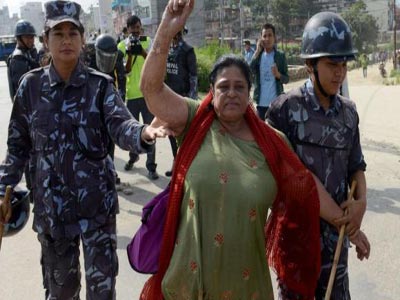
Nepalese police arrested 30 demonstrators in the capital on Sunday for trying to enforce a nationwide strike, the latest in a string of protests against the new constitution.
“We have arrested 30 demonstrators in Kathmandu for trying to block roads, vandalise vehicles and close shops,” police spokesman Kamal Singh Bam told AFP.
The protesters were from Nepal’s federation of indigenous nationalities, which called a nationwide strike against the borders of new provinces proposed in the draft constitution.
Nepal’s bickering parties struck a breakthrough deal earlier this month to carve the country into six provinces in a new constitution, since modified to include a seventh province.
But hundreds of demonstrators have campaigned against the proposed internal borders, saying they fail to ensure political representation for marginalised communities, including the Madhesis and Tharus.
The demonstrations have sparked clashes with police who have shot dead three people in Nepal’s midwest and south over the last two weeks.
Lawmakers from the Sadbhawana party, which represents Madhesis from southern Nepal, walked out of the constituent assembly on Tuesday saying they had been “reduced to helpless witnesses” in the political process.
Following the unrest Nepal’s political leaders revised the six-province model, adding a seventh province in the new draft, but the changes have failed to appease marginalised communities.
“This draft constitution does not ensure the rights of indigenous communities,” said Himal Dandu Sherpa, vice chairman of the federation of indigenous nationalities.
“The proposed demarcation breaks up home districts of indigenous groups in different provinces. That is not acceptable,” Sherpa added.
Political agreement on the borders was struck four months after April’s devastating earthquake helped bring a halt to the seemingly endless bickering between rival parties.
Uncertainty from the political wrangling had left the impoverished Himalayan nation in limbo.
Work on a new national constitution began in 2008 following a decade-long Maoist insurgency that left an estimated 16,000 people dead and brought down the 240-year-old Hindu monarchy.



